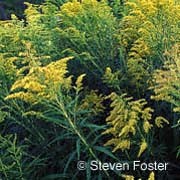Goldenrod
Historically, goldenrod (Solidago canadensis or Solidago virgaurea) has been used on the skin to heal wounds. It has also been used as a diuretic, meaning it helps the body get rid of excess fluid. The name solidago means "to make whole."
Goldenrod has also been used to treat tuberculosis, diabetes, enlargement of the liver, gout, hemorrhoids, internal bleeding, asthma, and arthritis. In folk medicine, it is used as a mouth rinse to treat inflammation of the mouth and throat.
A few animal and test tube studies suggest goldenrod may help reduce inflammation, relieve muscle spasms, fight infections, and lower blood pressure. It does seem to act like a diuretic, and is used in Europe to treat urinary tract inflammation and to prevent or treat kidney stones. In fact, goldenrod is often found in teas to help "flush out" kidney stones and stop inflammatory diseases of the urinary tract.
Goldenrod is often blamed for seasonal allergies. Actually it is another plant, ragweed, which blooms at the same time, that is usually responsible.
Plant Description
Goldenrod can crossbreed with other plants. As a result, there are at least 130 species of goldenrod in the United States alone. This herb is native to Europe and has spread to Asia, the Azores, and both North and South America.
European goldenrod is a perennial with single woody stems that grow to heights of 3 to 7 feet. It is often found along roadsides and in open fields. Its yellow flowers, which generally appear in August and September, are only about ¼-inch wide, but they come in large clusters. Its leaves alternate between jagged and smooth edges.
Most experts say goldenrod does not cause hay fever, or seasonal allergies. However, some people may have a skin reaction (allergic contact dermatitis) when they touch it. And some doctors may prefer not to give goldenrod to a person with hay fever.
Parts Used
The above-ground parts of the goldenrod plant are dried and used for medicine.
Medicinal Uses and Indications
Goldenrod may act as a diuretic, meaning it flushes water from the body by increasing urine output. It may also reduce inflammation. However, it has not really been studied in humans.
Goldenrod is sometimes suggested for the following conditions:
- Arthritis and gout
- Allergies
- Colds and flu
- Inflammation of the bladder or urinary tract
- Kidney stones
- Eczema (applied to the skin)
- Minor wounds (applied to the skin)
Never use herbal products on open wounds.
Available Forms
You can take goldenrod in a number of ways, including as a dried herb (for teas or in capsules), or as an alcoholic or fluid extract.
How to Take It
DO NOT give goldenrod to a child without talking to your doctor first.
As an adult, ask your doctor to help you find the right dose for you.
Precautions
The use of herbs is a time-honored approach to strengthening the body and treating disease. Herbs, however, can trigger side effects and interact with other herbs, supplements, or medications. For these reasons, you should take herbs with care, under the supervision of a qualified health care provider trained in the field of botanical medicine.
Some people may have an allergic reaction to this herb. DO NOT use goldenrod if you are allergic to it.
Side effects can include heartburn.
People with the following conditions should ask their doctor before taking goldenrod:
- High blood pressure (hypertension)
- Low blood pressure (hypotension)
- Osteoporosis
- Allergy to ragweed
- Fluid retention due to heart or lung problems
DO NOT take goldenrod if you are pregnant or breastfeeding, or have heart or kidney disease.
Possible Interactions
There are no known scientific reports of interactions between goldenrod and conventional medications, however, the following interactions are possible:
Diuretics (water pills): Goldenrod may make diuretics stronger, raising the risk of dehydration.
Lithium: Because goldenrod may act like a diuretic, it could cause levels of lithium to build up in the blood.
Other drugs: Due to its diuretic action, goldenrod may interact with any medication that is processed through the kidneys and urine.
Supporting Research
Apati P, Szentmihalyi K, Kristo ST, Papp I, Vinkler P, Szoke E, Kery A. Herbal remedies of Solidago -- correlation of phytochemical characteristics and antioxidative properties. J Pharm Biomed Anal. 2003;32(4-5):1045-53.
Apati P, Houghton PJ, Kite G, Steventon GB, Kery A. In-vitro effect of flavonoids from Solidago canadensis extract on glutathione S-transferase. J Pharm Pharmacol. 2006;58(2):251-6.
Blumenthal M, Goldberg A, Brinckmann J, eds. Herbal Medicine: Expanded Commission E Monographs. Newton, MA: Integrative Medicine Communications; 2000:178-181.
Bucciarelli A, Minetti A, Milczakowskyg C, Skliar M. Evaluation of gastroprotective activity and acute toxicity of Solidago chilensis Meyen (Asteraceae). Pharm Biol. 2010 Sep;48(9):1025-30. doi: 10.3109/13880200903453131.
Derda M, Hadas E, Thiem B. Plant extracts as natural amoebicidal agents. Parasitol Res. 2009 Feb;104(3):705-8.
Jiang T, Huang BK, Qin LP. A survey of chemical and pharmacological studies on Solidago. Zhong Xi Yi Jie He Xue Bao. 2006;4(4):430-5.
Morel AF, Dias GO, Porto C, Simionatto E, Stuker CZ, Dalcol II. Antimicrobial activity of extractives of Solidago microglossa. Fitoterapia. 2006;77(6):453-5.
Nair R, Kalariya T, Chanda S. Antibacterial activity of some plant extracts used in folk medicine. J Herb Pharmacother. 2007;7(3-4):191-201.
Schatzle M, Agathos M, Breit R. Allergic contact dermatitis from goldenrod (Herba solidaginis) after systemic administration. Contact Dermatitis. 1998 Nov;39(5):271-272.
Thiem B, Goslinska O. Antimicrobial activity of Solidago virgaurea L. from in vitro cultures. Fitoterapia. 2002;73(6):514-6.
Weber RW. Goldenrod. Ann Allergy Asthma Immunol. 2003;91(6):A6.
Webster D, Taschereau P, Belland RJ, Sand C, Rennie RP. Antifungal activity of medicinal plant extracts; preliminary screening studies. J Ethnopharmacol. 2008 Jan 4;115(1):140-6.
Yarnell E. Botanical medicines for the urinary tract. World J Urol. 2002;20(5):285-93.
Reviewed By
Steven D. Ehrlich, NMD, Solutions Acupuncture, a private practice specializing in complementary and alternative medicine, Phoenix, AZ. Review provided by VeriMed Healthcare Network.

 All rights reserved.
All rights reserved.